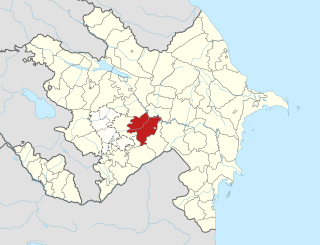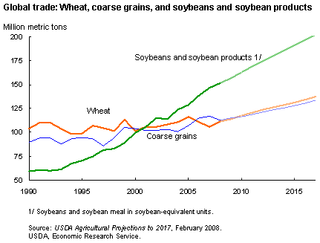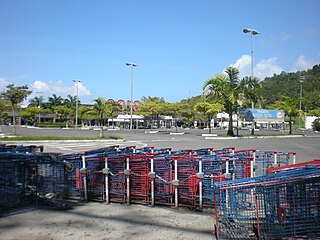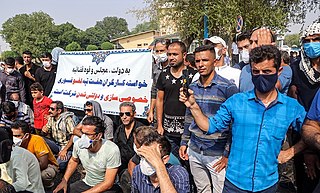Related Research Articles

The economy of Lebanon is classified as a developing, upper-middle income economy. The nominal GDP was estimated at $19 billion in 2020, with a per capita GDP amounting to $2,500. In 2018 government spending amounted to $15.9 billion, or 23% of GDP.

The fuel protests in the United Kingdom were a series of campaigns held in response to the rising petrol and diesel fuel prices for road vehicle use. There have been three notable campaigns amongst many other protests in the 21st century. The first major protest in 2000 was primarily led by independent lorry owner-operators. One group of lorry owner-operators from the South East of England formed a protest group called "TransAction" that protested at oil refineries and fuel depots in Essex. Protests and blockades of oil facilities caused widespread disruption to the supply of petroleum products. The aim of the protests was to secure a reduction in the fuel duty rate on petrol and diesel, which the government refused to enact. After the protest ended, the government did announce a freeze on fuel duties, and promised changes would be made to the way that goods vehicles were taxed, which would include the taxing of foreign vehicles operating on British roads.

Aghjabadi District is one of the 66 districts of Azerbaijan. It is located in the centre of the country and belongs to the Aran Economic Region. The district borders the districts of Khojavend, Agdam, Barda, Zardab, Beylagan, and Fuzuli. Its capital and largest city is Aghjabadi. As of 2020, the district had a population of 136,800.

Lankaran District is one of the 66 districts of Azerbaijan. It is located in the south-east of the country and belongs to the Lankaran Economic Region. The district borders the districts of Astara, Lerik, Masally, and Neftchala. Its capital and largest city is Lankaran, although the city is technically not part of the district and is subordinate to the Republic. As of 2020, the district had a population of 230,200.

Talysh-Mughan officially known as the Talysh-Mughan Autonomous Republic was a short-lived autonomous republic in Azerbaijan, that lasted from June to August 1993.
The Great Depression in the Netherlands occurred between 1933 and 1936, significantly later than in most other countries. It was a period of severe economic crisis in the 1930s which affected countries around the world, including the Netherlands.

Food riots may occur when there is a shortage and/or unequal distribution of food. Causes can be food price rises, harvest failures, incompetent food storage, transport problems, food speculation, hoarding, poisoning of food, or attacks by pests. Hence, the pathway between food related issues such as crop failure, price hike or volatility and an actual “riot” is often complex.

World food prices increased dramatically in 2007 and the first and second quarter of 2008, creating a global crisis and causing political and economic instability and social unrest in both poor and developed nations. Although the media spotlight focused on the riots that ensued in the face of high prices, the ongoing crisis of food insecurity had been years in the making. Systemic causes for the worldwide increases in food prices continue to be the subject of debate. After peaking in the second quarter of 2008, prices fell dramatically during the late-2000s recession but increased during late 2009 and 2010, reaching new heights in 2011 and 2012 at a level slightly higher than the level reached in 2008. Over the next years, prices fell, reaching a low in March 2016 with the deflated Food and Agriculture Organization (FAO) food price index close to pre-crisis level of 2006. As of May 2017 they have not reached crisis levels again, despite prices increasing.

The 2009 French Caribbean general strikes began in the French overseas region of Guadeloupe on 20 January 2009, and spread to neighbouring Martinique on 5 February 2009. Both islands are located in the Lesser Antilles of the Caribbean. The general strikes began over the cost of living, the prices of basic commodities, including fuel and food, and demands for an increase in the monthly salaries of low income workers.

The Jordanian protests were a series of protests in Jordan that began in January 2011, and resulted in the firing of the cabinet ministers of the government. In its early phase, protests in Jordan were initially against unemployment, inflation, corruption. along with demanding for real constitutional monarchy and electoral reforms.
The 2011–2012 Palestinian protests were a series of protests in the Palestinian National Authority and the Hamas-ruled Gaza Strip, staged by various Palestinian groups as part of the wider Arab Spring. The protests were aimed to protest against the Palestinian government, as well as supporting the popular uprisings in Tunisia, Egypt and Syria. The first phase of protests took place during 2011 and the second phase in 2012.

The Tunisian bread riots were a series of violent demonstrations in Tunisia that occurred from December 1983 to January 1984, triggered by a rise in the price of bread due to an IMF-imposed austerity program. President Habib Bourguiba declared a state of emergency and the riots were put down by force. Over 100 rioters died. The regime was weakened by the upheavals and their aftermath. Three years later General Zine El Abidine Ben Ali seized power in a coup.
The economy of Azerbaijan has gone through different stages of rapid growth, stability, and crisis. In general, economy of Azerbaijan, besides field-wise classification, can be divided into three categories: 1. recession period, covering 1992–1995, right after Azerbaijan restored its independence after the USSR collapsed, 2. recovery, from 1996 to 1997, mainly because of increased oil sales, potential oil contracts, partners, and pipelines, 3. boom, from 1998 till 2008, and finally, an economic fall, starting from 2009.
The 2018 Tunisian protests were a series of protests occurring throughout Tunisia. Beginning January 2018, protests erupted in multiple towns and cities across Tunisia over issues related to the cost of living and taxes. As of January 9, the demonstrations had claimed at least one life, and revived worries about the fragile political situation in Tunisia.

Zainab Pasha was a militant woman from Tabriz, Iran, known for the Tobacco Protest. She was a pioneer of the Tobacco Protest, which banned the use of tobacco, and instrumental in the protests that opened Tabriz temporary warehouses during the Bread Famine.

Algeria is a country located in Northern Africa along the Mediterranean coast. It is geographically the largest country in North Africa and has a population of approximately 42 million. Until the 1980s, Algeria enjoyed relative wealth after gaining independence from France in 1962 as its economy was buoyed by the booming price of oil. Poverty in Algeria became an acute problem following the collapse of its economic growth around the mid eighties. Since the 1980s, a fall in oil prices in international markets resulted in Algeria experiencing an economic downturn, contributing to rising unemployment and poverty. A lack of democracy, political conflict and government spending have also caused poverty.

Lankaran-Astara Economic Region is one of the 10 economic regions of Azerbaijan. It borders Iran to the south and west, Caspian sea to the east, and Aran economic region to the north. Region consists of Astara, Jalilabad, Lerik, Lankaran, Masally and Yardimli administrative districts. Other than the 6 districts, there are 8 cities, 13 settlements, 642 villages and 182 municipalities in the economic region. Each administrative district is headed by a chief executive appointed by the president of Azerbaijan. Heads of district executive powers are responsible for the establishment of representative offices of the executive power in the respective villages and settlements situated in their respective territories and appoint their representatives. Municipalities are divided into administrative-territorial units in districts and towns divided by settlements.

The Iranian protests are a series of ongoing demonstrations and government crackdowns erupting nationwide in Iran since 2016. The protests with the intention of removing the Iranian government are often fueled by low wages, unemployment, inflation, government corruption, an ongoing water crisis, Persian nationalist fervor and the government's handling of the COVID-19 pandemic.
References
- ↑ "Azerbaijan's 2016: sink or swim?". Open Democracy. 5 February 2016.
- ↑ "Azerbaijan forced to cut bread taxes after widespread protests". The Guardian. 15 January 2016.
- ↑ "Scores Detained In Azerbaijan Amid Countrywide Protests". RFERL. 14 January 2016.